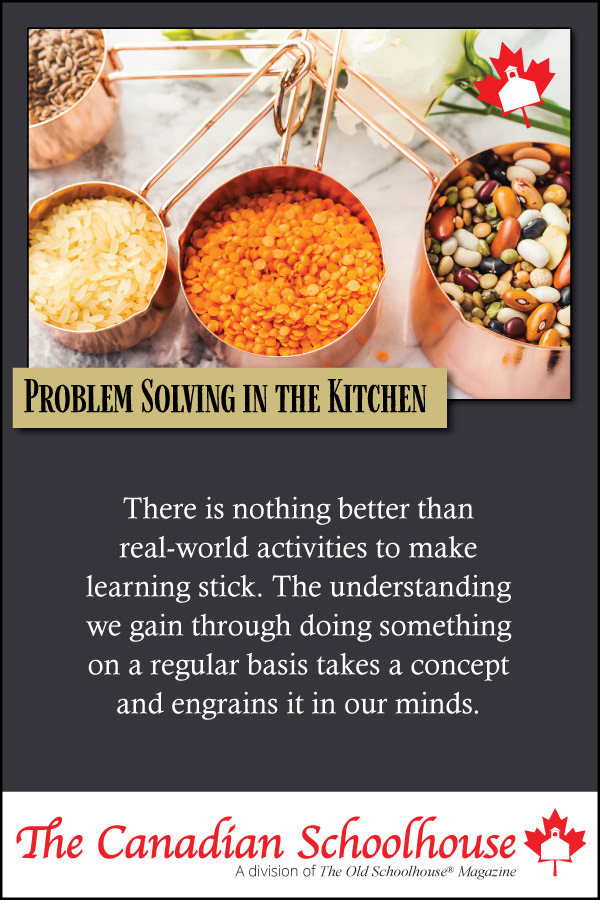

There is nothing better than real-world activities to make learning stick. The understanding we gain through doing something on a regular basis takes a concept and engrains it in our minds. The act of problem solving is a great way to get kids involved in problems that happen every day. There are many kids cooking activities that will help their problem solving ability. Cooking and baking involve math, science, life skills, nutrition, teamwork and so much more.
Ways Problem Solving Happens in the Kitchen
Adjusting recipes
Many times, a recipe needs to be adjusted in some way. Whether you are working around allergies or cooking for a smaller or larger group than the recipe feeds, there are many ways to adjust a recipe to fit your needs. Adjustments are a great way to create a kids cooking activity that teaches them to research, experiment and problem solve.
Countless times, a forgotten ingredient is only noticed when you have already started putting the recipe together. Why not let your kids be a part of figuring out what you have on hand that can replace the missing ingredient? Did you run out of milk? Can you use water instead? Will almond milk work for whole milk in a recipe? Not only does this help them problem solve with many possibilities, but it also prepares them for the time in the future when they may have the same issue.
Some other common adjustments made in the kitchen are
- Adding and removing ingredients from a recipe can make a basic recipe your own creation. Let your kids think of different ways to alter a recipe to make it fit their tastes like adding toffee to a chocolate chip cookie recipe or raisins to a bread recipe.
- Adjusting recipes for a friend or family member who has a nut allergy. Will your recipe work without the nuts? Can you add something to replace the nuts?
- Making a recipe gluten free. Gluten free flour works in place of the all-purpose flour in many recipes, but will the addition be 1:1 or do you need more of another ingredient to make the recipe work? It depends on the type and brand of flour you are using.
- Many times, a recipe is not quite enough for feeding the whole family. Another kids cooking activity that promotes problem solving is doubling, tripling or even quadrupling a recipe. This is a wonderful activity especially if your kids are working with fractions. Tripling ¾ cups is great practice for adding or even multiplying fractions. Take it one step further and half a recipe so you make less. This will be a great way to see and use numbers in a more memorable way.

Observation
Sometimes just observing is enough to give more understanding. Chemical reactions happen throughout cooking and baking. Observing the process and looking for signs of chemical reactions is a great way to understand how things work together.
Baking provides many different ways to see chemistry in action. The way two or three ingredients react will create bubbles, the rising of bread and so much more. Experiment with the amount of salt or baking soda in a recipe. Prepare the recipe twice, one with more than the other and see what happens. Here are a few different kitchen experiments showing chemical reactions between ingredients.
There are many things you can observe in cooking. Why do oil and vinegar separate when you are mixing your dressing? Why do greens wilt when they get hot? Even combining hot and cold ingredients can begin a fun observation.
Water is a simple way to make observations. Boiling and freezing water and starting from different temperatures can be a fun experiment.
There are so many ways kids can problem solve with kids cooking activities. Asking questions, making observations and experimenting are only just a few. Each time you cook or bake, get your children in on the process even if just for a short time to solve a problem.
Related Articles:
This article has been written by homeschooling staff writers of The Canadian Schoolhouse (TCS). Enjoy more of our content from TCS contributors and staff writers by visiting our Front Door page that has content on our monthly theme and links to all our content sections.














